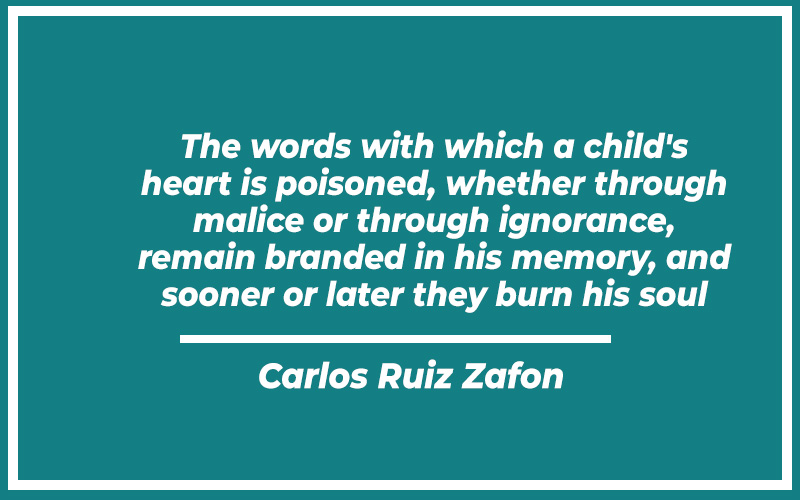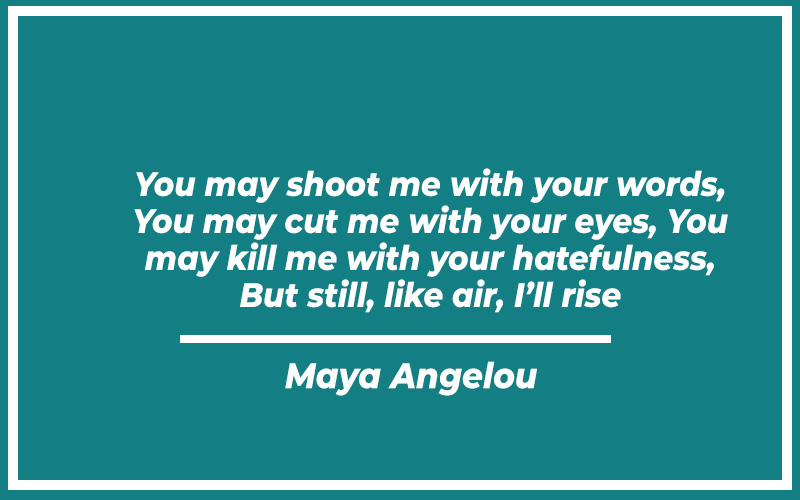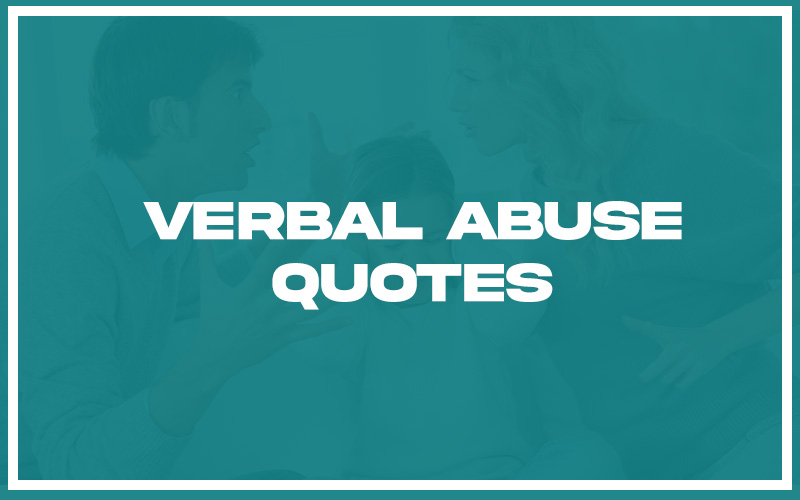Verbal abuse can hurt a lot and leave emotional scars that last. It is when someone uses words to control, put you down, or hurt you.
This can include criticism, threats, or always saying negative things. Anyone can be affected by verbal abuse.
These quotes show how much it can impact you and offer support and strength. By sharing these quotes, we hope to raise awareness and comfort those of you who have been or are going through verbal abuse.
Best Verbal Abuse Quotes

“The words with which a child’s heart is poisoned, whether through malice or through ignorance, remain branded in his memory, and sooner or later they burn his soul.” – Carlos Ruiz Zafon
This quote by Carlos Ruiz Zafon captures the enduring impact that verbal abuse can have on a person from a young age.
Words spoken in malice or ignorance can embed themselves deep in a child’s psyche, branding their memory and ultimately harming their soul. The harm from these words can manifest much later in life, highlighting the crucial need for nurturing communication in childhood development.
Also read: Put Yourself First Quotes (with Explanation)
“Your abusive partner doesn’t have a problem with his anger; he has a problem with your anger. One of the basic human rights he takes away from you is the right to be angry with him. No matter how badly he treats you, he believes that your voice shouldn’t rise and your blood shouldn’t boil. The privilege of rage is reserved for him alone.” – Lundy Bancroft
Lundy Bancroft’s quote reflects the manipulative dynamics of power in abusive relationships. It points out the cruel irony where the abuser permits themselves the full spectrum of emotional expression while systematically denying the same to their victim.
This dynamic is not only controlling but deeply unfair, highlighting a critical area where victims of verbal abuse are often silenced.
“Sticks and stones may break my bones, but chains and whips excite me.” – Rihanna
Rihanna’s lyrics from her song “S&M” playfully subvert the old saying about sticks and stones, turning the phrase into a declaration of strength and possibly reclaiming power over one’s own experiences.
It reflects an empowerment stance over the words and labels that others may use, suggesting a resilient attitude towards verbal attacks.
“Verbal abuse is the weapon used by cowards to break the spirit of the strong.” – Julie Burchill
Julie Burchill’s sharp observation suggests that verbal abuse is often employed by those who wish to exert control and dominate others.
This form of abuse is a tool for cowards, used to undermine and weaken those perceived as strong, thereby illustrating the sinister nature of verbal abusers who seek to corrupt and erode the spirit of their targets.
“Words are singularly the most powerful force available to humanity. We can choose to use this force constructively with words of encouragement, or destructively using words of despair. Words have energy and power with the ability to help, to heal, to hinder, to hurt, to harm, to humiliate, and to humble.” – Yehuda Berg
Yehuda Berg eloquently describes the dual nature of words as both a constructive and destructive force.
This quote underscores the inherent power of speech and how it can be used to uplift or devastate others. It serves as a reminder of the responsibility that comes with this power and the significant effects our words can have on others.
“I may have been broken by the words, but I refuse to be defined by them.” – Verbal Abuse Survivor
This empowering declaration from a survivor of verbal abuse highlights resilience and the refusal to be defined by past abuse.
It speaks to the strength and determination of those who have endured verbal abuse and their journey towards healing and defining themselves beyond their painful experiences.
“The scars from verbal abuse are invisible, but the pain is real.” – Verbal Abuse Survivor
Another poignant insight from a survivor, this quote brings to light the often invisible but deeply felt consequences of verbal abuse.
Unlike physical abuse, the scars left by verbal abuse are not visible on the body, yet they impact the victim’s mental and emotional well-being profoundly.
“Verbal abuse thrives in silence – break free by telling your story.” – Verbal Abuse Awareness Advocate
This quote emphasizes the insidious nature of verbal abuse and the power of silence in perpetuating it. By encouraging victims to share their experiences, it underscores the transformative effect of voicing one’s story.
Breaking the silence not only challenges the abuser’s power but also fosters a supportive community that validates and heals. It’s a reminder that speaking out can be a significant step towards recovery and empowerment.
“The greater the power, the more dangerous the abuse.” – Edmund Burke
Edmund Burke’s observation on power dynamics is a timeless reflection on the potential for abuse in relationships where one party holds significant power over another.
This quote serves as a cautionary note about the responsibilities that accompany power and the ethical obligations to wield it judiciously. It’s particularly relevant in the context of verbal abuse, where words can be wielded like weapons to dominate and control.
“No one can be as calculatedly rude as the British, which amazes Americans, who do not understand studied insult and can only offer abuse as a substitute.” – Paul Gallico
Paul Gallico’s commentary on cultural differences in expressions of rudeness offers an intriguing perspective on verbal abuse.
His observation highlights how verbal jabs can be both a cultural expression and a form of abuse, depending on their intent and reception. It suggests a complexity in verbal interactions where what is considered abuse can vary significantly across different societies.
“They have a word in Finnish called sisu, which basically means guts. You tell a Finn he doesn’t have sisu, that’s like spitting in his face.” – Arthur Lydiard
Arthur Lydiard’s quote about the Finnish concept of ‘sisu’ illustrates the profound impact of culturally specific words and how they can be used to hurt or demean.
It’s a stark reminder that verbal abuse can often tap into deeply held national or personal values to inflict pain, making the abuse particularly poignant and damaging.
“Screaming at children over their grades, especially to the point of the child’s tears, is child abuse, pure and simple. It’s not funny and it’s not good parenting. It is a crushing, scarifying, disastrous experience for the child. It isn’t the least bit funny.” – Ben Stein
Ben Stein’s strong stance against verbal abuse towards children, especially in the context of academic performance, underscores the lasting damage that such behavior can cause.
This quote reminds parents and guardians of the significant emotional and psychological impact their words can have on a child’s self-esteem and mental health.
“No one can make you feel inferior without your consent.” – Eleanor Roosevelt
Eleanor Roosevelt’s famous quote provides a powerful counter to verbal abuse, emphasizing personal agency and resilience. It suggests that while one may be subjected to demeaning or hurtful words, the power to define oneself remains firmly within one’s own control.
This message of empowerment is crucial for anyone facing verbal abuse, as it encourages maintaining self-worth in the face of adversity.

“You may shoot me with your words, You may cut me with your eyes, You may kill me with your hatefulness, But still, like air, I’ll rise.” – Maya Angelou
Maya Angelou’s words resonate as a defiant declaration of strength and resilience against verbal abuse.
This quote from her poem “Still I Rise” encapsulates the enduring spirit of those who refuse to be silenced or subdued by the harsh words of others. It serves as an inspiration for anyone enduring verbal abuse, highlighting the possibility of rising above the cruelty to reclaim one’s power and voice.
“Words have the power to wound, but they also have the power to heal.” – Verbal Abuse Counselor
This quote reflects the dual nature of language, emphasizing that just as words can inflict deep emotional scars, they also possess the capacity to mend and soothe. It serves as a reminder of the responsibility that comes with speech, urging individuals to choose words that heal rather than harm.
The potential for positive communication is a testament to the transformative power of words when used with compassion and understanding.
“Remember, words are just words – they cannot define who you truly are.” – Motivational Speaker
This motivational insight highlights the importance of self-definition beyond external labels or harsh words. It encourages individuals to not allow others’ perceptions and words to dictate their self-worth or identity.
This quote is particularly empowering for those who may struggle with the impact of verbal abuse, as it reassures them that they are more than the sum of others’ words.
“Verbal abuse is a reflection of the abuser’s character, not yours.” – Therapist
This quote sheds light on the source of verbal abuse, clarifying that the negative words reflect the issues and character of the abuser rather than the recipient.
It’s a crucial distinction that can help victims of verbal abuse understand that they are not at fault for the abuse they suffer. This understanding is fundamental in the healing process, as it shifts the blame from the victim to the abuser.
“In an abusive relationship, it’s important to remember that it’s not about your faults or shortcomings. The abuser is the one with the problem, and their hurtful words and actions are a reflection of their own issues, not yours.” – Relationship Counselor
This quote emphasizes the misplacement of blame in abusive dynamics. It highlights that the critical and demeaning behavior of an abuser stems from their own unresolved issues and insecurities.
Understanding this can be empowering for victims, as it reassures them that the abuse they experience is not a reflection of their worth but rather a manifestation of the abuser’s personal struggles.
“The scars from verbal abuse are invisible, but the pain is real.” – Verbal Abuse Survivor
This quote from a survivor brings attention to the often overlooked but significant impact of verbal abuse. While physical abuse leaves visible marks, verbal abuse scars the psyche, causing wounds that are hidden yet profoundly painful.
Recognizing the reality of this pain is vital in validating the experiences of those affected and fostering empathy and support.
“You deserve love, respect, and kindness. Don’t settle for anything less.” – Self-Help Author
This quote is a poignant reminder of the basic rights everyone is entitled to in any relationship.
It encourages individuals to recognize their worth and demand the respect, love, and kindness they deserve. Especially for those experiencing verbal abuse, this message is a crucial affirmation that helps bolster self-esteem and advocates for healthier, more supportive relationships.
“The pain inflicted by verbal abuse may be invisible to the eye but is felt deeply in the heart.” – Psychologist
This quote emphasizes the emotional toll that verbal abuse can have, even though it leaves no physical marks.
The pain, though invisible, is deeply felt and can have long-lasting effects on a person’s emotional well-being, underscoring the seriousness of verbal abuse.
“Verbal abuse can isolate you, but sharing your story connects you to others who will stand by you.” – Community Support Advocate
This statement highlights the isolating nature of verbal abuse and the power of community in the healing process.
Sharing one’s experience can foster connections with others who understand and can offer support, thus breaking the cycle of isolation.
“The loudest words are those that contain silence.” – Philosopher
This profound observation suggests that the things left unsaid in a verbally abusive relationship can sometimes have the most significant impact, resonating more deeply than spoken words.
It speaks to the power of what is implied or withheld in communication.
“Choose your words carefully; once they are said, they can only be forgiven, not forgotten.” – Author
This quote serves as a caution about the permanence of spoken words. It reminds us that words, once uttered, can never be truly taken back.
They can be forgiven, but their memory may linger, influencing relationships long after.
“A harsh word is like a strike to the heart; it may not leave a bruise, but it leaves a scar.” – Poet
Comparing harsh words to physical strikes, this quote poignantly captures the deep emotional scars left by verbal abuse.
Like a physical wound, the damage from a harsh word can linger long after the moment has passed, affecting one’s emotional health and self-perception. It serves as a powerful warning about the destructive power of words.
“Silence against verbal abuse is not golden; it is a chain that binds the victim to suffering.” – Human Rights Activist
This quote challenges the adage that silence is golden, particularly in the context of abuse. Silence, when it comes to abuse, is portrayed as a restraint that keeps the victim bound to their suffering.
It advocates for speaking out as a form of breaking free from the cycle of abuse, highlighting the importance of voice and action in combating verbal mistreatment.
“Healing from verbal abuse begins with recognizing the lies in the words spoken to you.” – Therapist
This therapeutic insight highlights the first step in healing from verbal abuse: discernment of truth from lies.
By identifying the falsehoods in an abuser’s words, victims can begin to detach their sense of self-worth from the abusive narrative, paving the way for recovery and self-reclamation.

“Verbal abuse is the deliberate act of making someone feel worthless; it is the calculated destruction of another’s self-worth.” – Social Worker
This definition underscores the intentional and harmful nature of verbal abuse. It is not just careless speech but a targeted attack designed to undermine an individual’s sense of value.
Recognizing it as a deliberate act helps in acknowledging its severity and the need for deliberate counteractions to protect and rebuild the victim’s self-esteem.
Also read: Glennon Doyle Quotes (with Explanation)
Final Thoughts
Verbal abuse can really affect your life. Remember, you are not alone, and there is help available.
These quotes are here to raise awareness and give you comfort. Stay strong and don’t hesitate to seek support when you need it.

